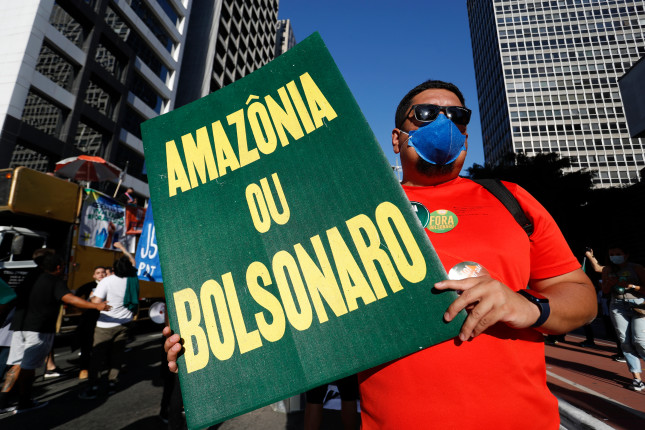-
Does Foreign Climate Shaming Lead to Nationalist Backlash?
The United States and Europe are beginning to deploy naming and shaming tactics to increase compliance with global environmental norms.
The Biden Plan for a Clean Energy Revolution and Environmental Justice committed to “name and shame global climate outlaws.” During the presidential campaign, Biden warned Brazil: “Stop tearing down the forest…And if you don’t, then you’re gonna face significant economic consequences.” President Emanuel Macron of France went on the offensive too. “The Amazon forest is on fire,” he tweeted before charging President Jair Bolsonaro of Brazil with lying about deforestation data.
Critics of shaming tactics warn that they can have negative unintended consequences. The fear is that critical messages ignite popular nationalist backlash against international norms and institutions, entrenching popular opposition to climate change mitigation.
Concerns that foreign climate shaming might backfire are acute at a time when anti-climate leaders the world over are tempted to manipulate domestic public opinion via emotions like anger, resentment, and outrage against foreign meddling.
Should states resort to climate naming and shaming? And when they do, what should they expect?
In a newly published article in Global Environmental Politics, we look for answers by fielding two survey experiments to samples of the general population in Brazil, a country that in recent years has dismantled its climate policies and has seen a marked increase in carbon emissions from deforestation. To the best of our knowledge, this is the first experimental study of nationalist responses to foreign climate shaming in a developing country.
We find that nationalism moderates how individuals react to foreign climate criticism. Highly nationalist individuals respond differently than their less nationalistic peers, reinforcing the notion that shaming is a subjective perception and different people will interpret and react to it in distinct ways.
Individuals who rank high on a scale of nationalism have a lower propensity than less nationalist individuals to respond to foreign climate shaming by expressing regret (admitting to past misdeeds, showing remorse, and promising to repair the situation in the future). Expressing regret signals goodwill and seeks to alleviate suspicion about future intentions.
We find that highly nationalistic individuals, by contrast, are more defensive. Some nationalists choose to reject the criticism, suggesting that the critic is driven by obscure motivations.
Other nationalists prefer to react to the criticism by defying it. Defiance is a recommitment to norm-offensive behavior in the future. Individuals who choose to defy foreign criticism offer a defensive reaction to social sanctioning. Defiance calls for doubling down on the transgressing behavior. When defiance is the outcome, the foreign criticism has backfired.
In our study, the vast majority of nationalists choose to reject—but not to defy—the criticism.
This bodes well for naming and shaming tactics in global climate politics. The majority of highly nationalist individuals in Brazil may question the intentions of critics, but they are not willing to challenge the criticism by adopting extreme measures. These results suggest that nationalist populations can engage in the rational calculations typical of cognition.
It is plausible to expect the dynamics we describe in our article to extend to cases beyond Brazil, especially in situations where historical memories of foreign imposition provide fodder for nationalist sentiment. Obvious candidates include other Amazon basin countries like Bolivia, Ecuador, Colombia, and Peru, but also Malaysia and Indonesia in East Asia or the countries in Central Africa that make up the Congo basin.
While anti-climate leaders may succeed in getting their domestic populations to question the intentions of foreign critics, they are likely to have a hard time mobilizing popular support to defy international climate norms. Foreign climate criticism is likely to bump up against nationalist sentiment, but critics should not be deterred. The use of foreign climate criticism as a tool to drive compliance with the global environmental regime seems unlikely to lead to defections from these norms and institutions or make an already fragile regime weaken further.
While naming and shaming might not spark nationalist backlash, further research to identify the conditions under which foreign criticism might ignite popular defiance is needed. Understanding and avoiding the pathways by which foreign climate shaming leads populations in target states to recommit to noncompliant behavior is urgent if we are to avoid such an outcome.
Matias Spektor is Associate Professor at the School of International Relations at FGV in Brazil.
Umberto Mignozzetti is visiting assistant professor in the Department of Quantitative Theory and Methods at Emory University.
Guilherme Fasolin is Research Associate at the School of International Relations at FGV in Brazil.
Sources: AP News, France24, Global Environmental Politics, Joe Biden.
Photo Credit: Man holds a sign that reads in Portuguese “Amazon or Bolsonaro” during a protest demanding the impeachment of the President Jair Bolsonaro in Paulista avenue, courtesy of Nelson Antoine, Shutterstock.com.
 A Publication of the Stimson Center.
A Publication of the Stimson Center.




